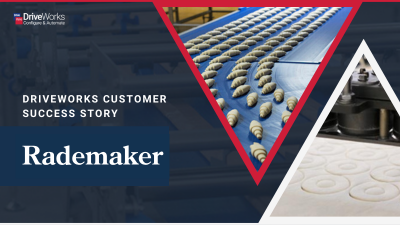Manufacturers are increasingly looking for ways to deliver faster, cheaper, and better products, and one of the most effective ways of achieving this is with design automation.
Design automation removes much of the manual work associated with traditional CAD workflows. By automating time-sensitive and repetitive upfront activities, manufacturers produce more designs, in less time, reduce bottlenecks and errors, and significantly reduce their costs.
What is design automation?
Design automation is the use of software tools and technologies to automate repetitive and time-consuming tasks within the design process. For design engineers in custom manufacturing, it means creating systems that can automatically generate CAD models, drawings, BOMs, and additional manufacturing documents and data, all based on user-defined inputs.
Rather than re-drawing the same component with slightly different dimensions for every new design request, design automation automatically creates the new design. Design automation technology works on the rules and constraints set by your design engineers.
How design automation reduces costs
Shorter design cycles
Manual design processes for custom products can be time-consuming. Engineers spend a lot of time on “same but different” designs. With design automation, once a rule has been set up, multiple variations can be automatically generated. This reduces design lead times and enables manufacturers to produce more designs in less time.
Cost impact: Lower staffing costs and quicker time-to-market
Fewer errors and revisions
Manual errors in the design process can lead to errors, incorrect quotes, and unnecessary rework. Design automation reduces the risk of error by following predefined rules and parameters.
Cost impact: Reduced levels of rework and stock wastage
Efficient use of resources
Design automation optimizes material usage and streamlines processes. Streamlined workflows mean fewer wasted resources, both human and material, as design engineers are freed up to work on higher-value work, such as new product development.
Cost impact: Less material waste and improved efficiency
Scalability without extra overheads
Manual design processes are unable to handle increased volumes of custom product designs efficiently and without the need for significant additional resource. The automation of repetitive tasks associated with custom design enables businesses to easily scale up their operations without the need for additional headcount.
Cost impact: Lower hiring and training costs
Customized products produced faster
Customers expect an increasingly complex level of customization, however, scaling customized designs can be a challenge for design teams. That’s where design automation technology can have a big impact. With features like dynamic templates and advanced drawing controls, you can easily create large volumes of customized designs with much shorter turnaround times.
Cost impact: Increased revenue potential with minimal design resource

Rademaker: Reduced engineering time and increased quality
Rademaker has over 40 years of experience providing solutions for the food processing industry. Their broad portfolio of production lines includes bread, laminated dough, croissants, pastry, pies, and pizza.
Before implementing DriveWorks the engineering time required to prepare an order for manufacturing was substantial and Rademaker identified the need for a product configurator and SOLIDWORKS automation solution to optimize their engineering processes. They wanted the ability to fill out the specification of a machine and have the 3D models, drawings, and BOMs automatically generated.
Using DriveWorks technology they now automatically update their SOLIDWORKS parts and assemblies, and create production-ready engineering drawings. This removes repetitive tasks from the engineering team, freeing valuable resources for other tasks.
Subsequently, Rademaker achieved their target of reducing engineering time to less than 15 minutes for modular units. They also achieved a 30% reduction in time during the standardization process as DriveWorks enabled them to optimize their product structure workflow.
DriveWorks design automation for SOLIDWORKS®
DriveWorks design automation solution enables you to quickly and accurately create multiple variations of your SOLIDWORKS parts, assemblies, and drawings, and deliver custom products faster and with precision. Exclusively designed for SOLIDWORKS, DriveWorks is the perfect solution to streamline your processes and stay ahead of the competition.
DriveWorksXpress entry-level design automation is included free in every seat of SOLIDWORKS.
SOLIDWORKS users looking for a more comprehensive design automation experience can also download a 30 day free trial of DriveWorks Solo. Make the most of your free trial by setting clear goals, testing key features on real projects, and making the most of a whole host of free training material. Use the time to evaluate its impact on your workflows and ensure it meets your needs. You can also set up a meeting with a technical expert from the DriveWorks team to help you get off to the best start.